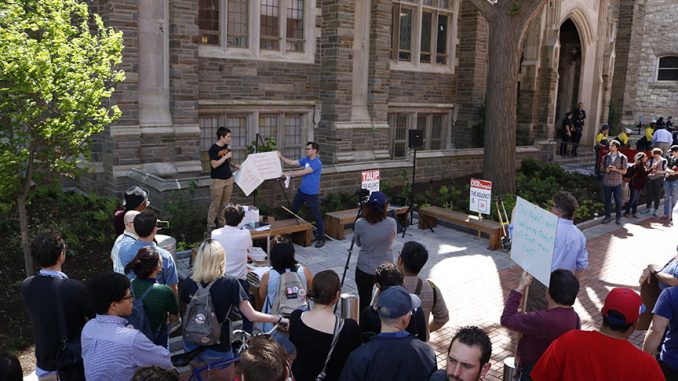
The university and its faculty union, Temple Association of University Professionals, reached a tentative agreement last week after 15 contentious months of contract negotiation.
The new contract creates a single contract for full-time and adjunct faculty and outlines a two-year plan for incrementally increasing the base wage for adjuncts per credit hour. The contract was approved by TAUP’s executive board on Wednesday and must be ratified by current and prospective members of the union.
Steve Newman, the president of TAUP, said while he would like to have the contract ratified in September, the union is still determining what adjuncts are eligible to ratify it. He said it was a “complicated” process because there is no specific list of adjuncts who can vote.
“This is, while not a perfect deal, a good deal and an excellent first step,” Newman said. “It lays the groundwork for the steps we want and need to make in the future.”
Adjuncts voted to join TAUP in December 2015, which represents about 1,300 full-time faculty, librarians and academic professionals, like lab technicians and academic advisers, in schools that enroll undergraduate students. If the contract is ratified by the adjuncts, about 1,400 part-time faculty will be added to the union.
Over the next two years of the contract, the adjuncts’ minimum pay set per credit hour will increase by more than 15 percent. At the moment, adjuncts are paid a minimum $1,300 per credit hour that they teach — meaning a three-credit course would earn them $3,900 total.
In the first year of the tentative contract — during the 2017-18 academic year — adjuncts would receive a $125 raise, making the minimum $1,425 per credit hour. Then in 2018-19, the contract would add another $75 raise, putting the minimum at $1,500 per credit hour. This means in 2019, adjuncts would be receiving $4,500 for a three-credit course. The individual colleges can choose to give adjuncts a higher per-credit pay as a result of the university’s decentralized budget.
Each school will be responsible for finding the money to pay for the raises, which will apply to all faculty, whether they are in the union or not.
SHARON BOYLE
ASSOCIATE VICE PRESIDENT OF HUMAN RESOURCES
For several months, the two sides debated what kinds of protections the adjuncts would have under the new contract. The current contract is set to expire in October 2018.
“Almost all of [the contract] was difficult to negotiate,” said Sharon Boyle, the associate vice president of Human Resources and the university’s chief negotiator. “We had to have a lot of intense and detailed discussions.”
She added that both sides had the same overall goals but different perspectives on how to achieve them.
During Spring 2017, several Letters to the Editor were written and published in The Temple News by Boyle and members of TAUP, publicly debating about the contract negotiation.
“Even though it seemed contentious, it was a process and we needed to go through it,” Boyle said.
The contract will also include a set policy for adjuncts to complain about any contract violations and the arbitration process for those grievances. It will also define adjuncts’ rights to academic freedom.
Several committees will be made as a joint effort from the university and TAUP to examine affirmative action, office space and job security for adjuncts, said Jennie Shanker, TAUP’s vice president.
“We’ve gotten a foot in the door,” Shanker said. “It means a lot just to have a contract.”



Be the first to comment